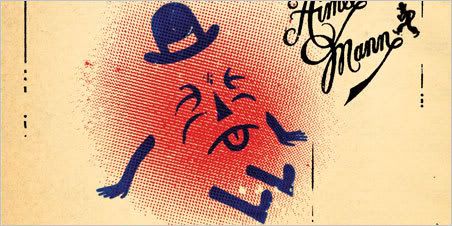
“Thirty One Today“
from the album @#%&! Smilers
2008
iTunes
Aimee Mann named her new release @#%&! Smilers as a tongue-in-cheek protest of people who constantly prod others to put on a happy face, even when they don’t feel like it.
But as Mann herself admits, her seventh solo album, due June 3 on her own SuperEgo Records, is one of her most “smiley” works to date.
And why shouldn’t it be? The singer-songwriter has enjoyed more than two decades of success, much of it through her own toil as a pioneer of the now thriving do-it-yourself model of the music business. Smilers is the former ‘Til Tuesday vocalist’s fifth release on SuperEgo, which she founded with manager and longtime collaborator Michael Hausman in 1999 after negotiating a contract release from Geffen.
The themes on Smilers aren’t all cheerful — Mann masters wistfulness and dissatisfaction on songs like the synth-laced “Thirty One Today” — but there’s a musical playfulness throughout that culminates in closer “Ballantines,” a piano-bar romp with trombones. The variety is a deliberate departure from 2005’s The Forgotten Arm, a musical “novella” about a relationship headed for trouble.
“I think because the last record was a concept album and had a narrative that went through the whole record, I was in the mood to do something completely different and make every song its own thing,” Mann says. “So if it needed horns, great. If the next song was just acoustic guitar and sounds like Neil Young, great.”
Hausman says that Mann’s desire for this level of creative control was a major factor in her decision to leave the major-label system. “Her decision was based on creative reasons,” Hausman says, “and I gave her the confidence that from a business standpoint, she could make a living.”
Boosting this confidence was Mann’s success with the 1999 Magnolia film soundtrack, as well as the pair’s early grasp of how to leverage the then-nascent power of the Internet to reach fans.
“We had been collecting e-mail addresses since the mid-’90s, as soon as people started using e-mail,” Hausman says. “By the time Aimee went solo, I think we had 10,000 e-mails.” Mann then offered free downloads to promote 2000’s Bachelor No. 2 (Or the Last Remains of the Dodo), “which no one else was doing then,” Hausman says. That album has sold 230,000 units, according to Nielsen SoundScan; 2002 follow-up Lost in Space sold 232,000 and hit No. 35 on the Billboard 200.
Hausman admits that it’s harder to be as cutting-edge in the current environment. “We didn’t go for a radical model like Radiohead did, (with) fans setting their own price,” he says. “Aimee needs to sell records and make a profit. Her touring is very strong, but it’s not superstar touring. So we need the record company model to work.”
Mann will tour through the end of the year, a trek that will include her acclaimed Christmas variety show featuring comedy and video in addition to music. Mann says that although it’s hard to make money on the road, it may be another key to staying ahead of the curve.
“Everybody can make a record on GarageBand, everybody has a MySpace page,” she says. “I think maybe people who play live well are going to raise their heads above the fray. Making a record is more smoke and mirrors, but playing live, you really have to know what you’re doing.”


